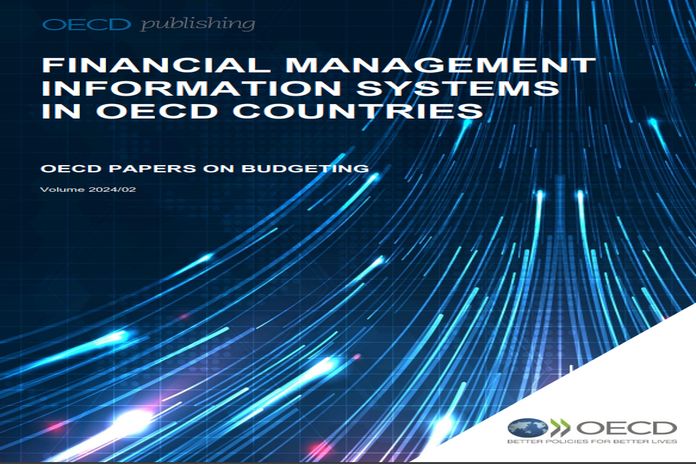By Delphine Moretti, Anne Keller, Ivor Beazley
Financial Management Information Systems (FMIS) are central to good public financial management, providing an integrated platform for managing the numerous and varied financial operations of government. OECD countries have implemented significant and innovative IT reforms in the past, which have underpinned the development of strong and modern PFM frameworks in most countries.
The Organisation for Economic Co-operation and Development (OECD) recently published a comprehensive study on FMIS practices in 34 of its 38 member countries, based on a 2022 OECD Survey on Financial Management and Reporting. This survey looked at key strategic choices made by governments regarding the design and implementation of their FMISs, including:
- Whether to allocate responsibilities for developing a central FMIS for the whole of government to the ministry of finance, or to devolve responsibility for FMIS to individual entities.
- How far to integrate financial management functions on a single platform and when to rely on interfaces and data sharing solutions.
- What level of ownership to expect from the system – for example, whether to use an ERP or a bespoke solution, whether to retain control of the hardware and software or to move to cloud computing.
The survey shows that there is no ideal FMIS design or software choice. First, there is no consensus on whether centralization or decentralization is best. Among OECD countries, 59 percent opt for a partially decentralized FMIS, combining central and devolved features. Integration of financial management functions also varies: 45 percent of countries use multiple IT systems with interfaces for data exchange, 38 percent have interconnected core functions supported by a common platform, and only 17 percent have fully integrated systems. Software choices are similarly diverse: 53 percent of countries use commercial off-the-shelf software (COTS) for their central FMIS, while 20 percent use bespoke systems from commercial developers and 27 percent use systems developed by in-house IT departments.
The survey highlights that development and success of an FMIS hinges significantly on policy decisions that consider and analyse local circumstances, including:
- The wider legal and public finance framework, and related opportunities and challenges. The challenges include relationships between different levels of government and the level of autonomy of the various entities within central government, which in turn shape administrative responsibilities or reporting requirements.
- Key objectives for the digitalisation of financial management functions and the need for standards and guidance, such as government-wide criteria for FMIS procurement, a unified chart of accounts, and a standardised risk assessment for cloud-computing services.
The survey also highlights that, despite their pioneering role and early successes in rolling out FMISs, many OECD countries now find themselves locked into legacy technologies that are insufficiently responsive to changing financial management needs and new expectations of internal and external users. Accordingly, a large majority of OECD countries plan major changes or upgrades to their systems.
The accumulated experience from previous waves of FMIS rollouts has equipped OECD countries with significant insights for these upcoming reforms. They have learned valuable lessons about system integration, user training, and balancing customisation with standardisation. For instance, the survey shows that although enterprise resource planning (ERP) systems have been largely adopted in previous decades, their use has some way still to develop. The capacity of these systems to reflect all relevant business processes within government is among the top-five challenges of IT projects identified by respondents. Another commonly cited challenge is the performance of the COTS service provider.
While historical lessons are invaluable, they may not be enough for successfully implementing the next wave of reforms, as OECD countries navigate the frontier of recent technological advances. New cutting-edge technologies set indeed the stage for a potential revolution in the digitalisation of financial management functions, which is likely to be even more transformative than the earlier adoption of ERP systems. Their integration has started in most OECD countries –70 percent of survey respondents use or plan to use respectively cloud computing, Robotic Process Automation or Artificial Intelligence.
This will require ministries of finance to develop the skills and capacities for identifying where new opportunities and challenges may arise from the use of these technologies. Further, in managing such these new wave of reforms, ministries of finance will need to acknowledge the wider context of their governments’ digital transformation strategies. Future FMISs should not aim only to improve financial management efficiency but also be able to evolve quickly and support effectiveness of policies and create more open, transparent, innovative, participatory and trustworthy governments. More than ever, a “business as usual” approach to FMIS that reinforces existing internal government processes would likely lead to disappointing outcomes and public criticism.
– The Organisation for Economic Co-operation and Development (OECD) is an international organisation that works to build better policies for better lives. We draw on more than 60 years of experience and insights to shape policies that foster prosperity and opportunity, underpinned by equality and well-being. (oecd.org)
![]()





